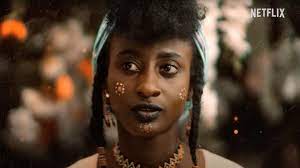A fantastical change of pace with insights into African folktales.
Tucked away in Netflix’s expansive science fiction and fantasy collection is a 2023 anthology of stories from across Africa. African Folktales Reimagined is a joint project of UNESCO and Netflix. The six films are retellings of folktales from Uganda, Nigeria, Kenya, Mauritania, Tanzania, and South Africa. The stories are not only interesting on their own, but they provide inspiration to explore the traditional stories on which they are based.
Katera of the Punishment Island is a film from Uganda, by director Loukman Ali. It is inspired by stories of an old practice of sending pregnant girls to a small island as punishment for getting pregnant before marriage. The punishment island is based on a true story of an island in Lake Bunyoi, Uganda where unmarried pregnant girls were sent. The expectation was that they would die but some girls were rescued by men seeking wives. In the film, Katera is trapped and chained on the island but is rescued by a man from a nearby village. Once free, she hatches a plan to take revenge on the person who put her there.
Halima’s Choice is from Nigerian director Korede Azeez. The story is inspired by the folktale of the “Disobedient Daughter Who Married a Skull.” In the original folktale, the daughter refuses all of her suitors but is charmed by a stranger who arrives in the village. The stranger is actually a skull who has borrowed body parts from others in the spirit world to make itself appear as a handsome human man. The Netflix film does a twist on the story, setting the tale in a futuristic world where a majority of the world’s population lives in a Matrix-like artificial reality. Halima’s community is one of the few places where humans live “real” lives. However, life in the real world is not perfect, in fact, it’s harsh and simple. Halima is an independent young woman whose family has arranged a marriage to a man she doesn’t want. When a handsome young traveler arrives in their isolated village, the community suspects he may be one of the AI entities who infiltrate villages to lure people into the artificial world. But Halima is bored with her rural existence and feels a connection to him. The story is particularly timely given the current debate over the role of AI in our society.
Anyango and the Ogre – From Kenya, directed by Voline Ogutu, Anyango and the Ogre is inspired by a traditional tale of an ogre who pretends to be kind to trick people into trusting him so he can devour them. In the Netflix film, society is divided. The Blue Zone has comfortable homes and modern conveniences while the rest of humanity lives in harsh, rustic conditions. A widow with three children, agrees to marry a wealthy man so that she can bring her family to the Blue Zone. However, her new husband is not what she expected and their comfortable life comes a high cost. The story deals with domestic violence and child abuse, so be warned. My favorite thing about this story is the way it overlaps the ogre folktale onscreen as a parallel to the real life suffering of the widow and her children. The crossover storytelling is a great technique to tell a difficult story.
Enmity Djinn – From Mauritania, by director Mohamed Echkouna, a mysterious Djinn (Jinni) appears in the town where a grandmother lives with her extended family. The Djinn’s invisible presence escalates enmity in the community and in the grandmother’s family specifically. The story uses simple, dark costuming to convey the Djinn’s presence in a way that is sinister and eerie. Through flashbacks we see the grandmother encountering the Djinn as a baby as the sole survivor of a slaughter. The scenes of her family’s current beautiful home are contrasted with the presence of the Djinn. In a particularly clever scene, the grandmother talks to her young granddaughter about colors and each color evokes symbolic elements as she considers how to confront the Djinn that only she can sense.
Katope – Katope is a story from Tanzania, by director Walt Mzengi. This is my favorite tale in the collection. Katope is based on the folk tale of the mud child. In the folk tale a couple wishes for a child and makes one out of mud. Because the child is made of mud he cannot ever be caught in the rain or he will be destroyed. In the Netflix film, Katope is a girl who comes to life when an old woman who wishes desperately to have a child forms one from mud. However, since Katope’s birth, there has been a terrible drought. When a rain bird appears, Katope makes a choice for her community. The story is simple and the visual effects are subtle. It’s a sweet poignant tale.
MaMlambo – From South Africa, by director Gcobisa Yako, MaMlambo is inspired by the water goddess from Zulu folklore. Instead of portraying Mamlambo as a malevolent being, the film reimagines Mamlambo as a protector of women who have been victims violence. The film emphasizes female empowerment in response to gender based violence and uses water as a symbol of rebirth.
With so many excellent choices out there, this anthology might slip by you. The presentations are minimalistic and lack elaborate visual effects. Many of the stories involve violence against women. Most of the stories are bleak rather than uplifting. But if you are in the mood for something completely different, this collection might be just the thing to capture your imagination.
--
The Math
Nerd Coefficient: 7/10
Highlights
• Clever storytelling
• Minimal special effects
• A change of pace
POSTED BY: Ann Michelle Harris – Multitasking, fiction writing Trekkie currently dreaming of her next beach vacation.
